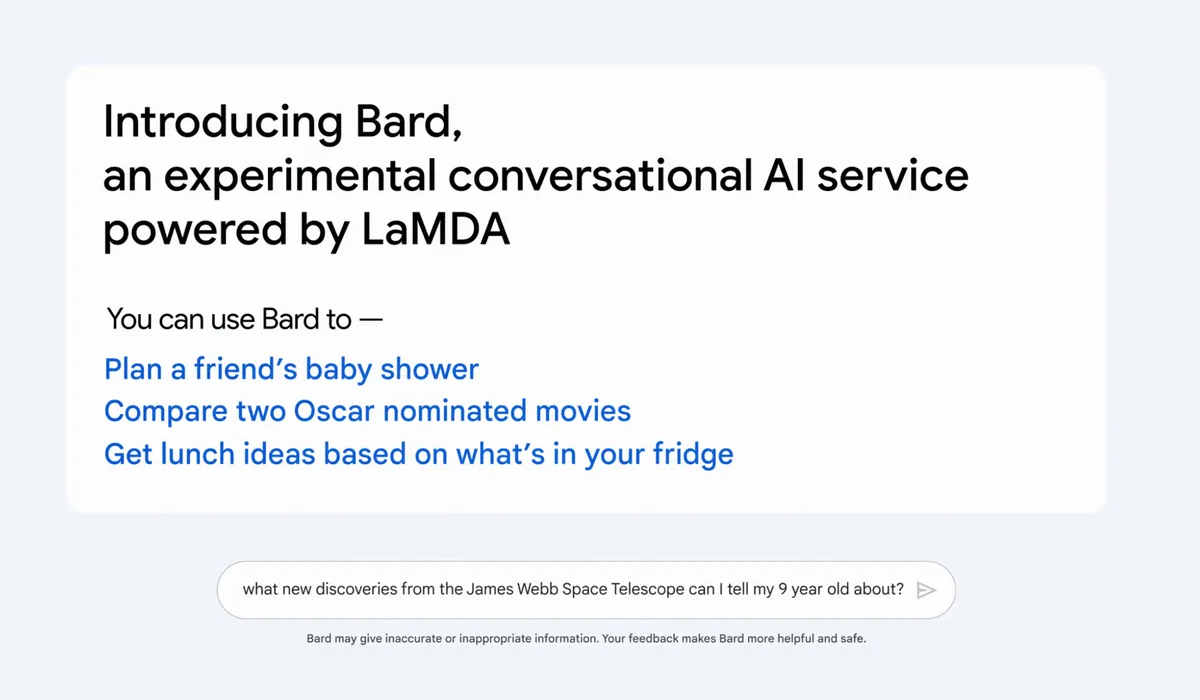 AI
AI
 AI
AI
 AI
AI
Google LLC today announced plans to launch an artificial intelligence search tool, Bard, that will be capable of providing detailed natural language answers to user queries.
Bard will initially become accessible to a group of “trusted testers,” Google Chief Executive Officer Sundar Pichai detailed in a blog post. The search giant plans to make the service more broadly available in the coming weeks. In parallel, Google will roll out several other new search features likewise powered by AI.
Bard features a chatbot interface similar to OpenAI LLC’s ChatGPT service. When a user enters a search query, Bard doesn’t return a list of webpage links but rather a detailed natural language answer. The chatbot can process input of varying complexity, including advanced questions such as requests to explain recent scientific discoveries in a simplified form.
“Bard seeks to combine the breadth of the world’s knowledge with the power, intelligence and creativity of our large language models,” Pichai detailed. “It draws on information from the web to provide fresh, high-quality responses.”
Bard is powered by a large language model called LaMDA that Google debuted in 2021. LaMDA, in turn, is based on a neural network design known as a Transformer architecture. Neural networks based on the architecture can take the context of a word or sentence into account when attempting to determine its meaning, which makes them more accurate than earlier AI models.
The ability to understand text accurately is especially valuable for search applications. The Transformer architecture enables search algorithms to understand the meaning of complex user queries, as well as find relevant text.
Last May, a year after LaMDA made its initial debut, Google detailed that the AI model was trained on a dataset comprising 1.56 trillion words. The search giant also stated that the most advanced version of LaMDA available at the time featured 137 billion parameters. Parameters are the settings that determine how an AI model processes data.
According to Google, the initial release of Bard that will start rolling out in coming weeks is powered by a lightweight version of LaMDA optimized for hardware efficiency. “This much smaller model requires significantly less computing power, enabling us to scale to more users, allowing for more feedback,” Pichai wrote. “We’ll combine external feedback with our own internal testing to make sure Bard’s responses meet a high bar for quality, safety and groundedness in real-world information.”
Bard is one of several new AI search capabilities that Google plans to roll out. The company will also equip its search engine with features that can “distill complex information and multiple perspectives into easy-to-digest formats, so you can quickly understand the big picture and learn more from the web,” Pichai detailed. The update is expected to roll out in the near future.
In conjunction, Google will release a new AI service for developers. The service, known as the Generative Language API, is set to become available next month. It will provide access to LaMDA on launch with support for additional neural networks set to roll out in the future.
Minutes after Google debuted Bard today, Microsoft Corp. announced plans to hold a press event at its Redmond, Washington headquarters on Tuesday. The company didn’t specify the focus of the event. But it’s believed Microsoft could debut its conversational search tool for Bing, which recent reports suggest is powered by a newer version of OpenAI’s ChatGPT chatbot.
Support our open free content by sharing and engaging with our content and community.
Where Technology Leaders Connect, Share Intelligence & Create Opportunities
SiliconANGLE Media is a recognized leader in digital media innovation serving innovative audiences and brands, bringing together cutting-edge technology, influential content, strategic insights and real-time audience engagement. As the parent company of SiliconANGLE, theCUBE Network, theCUBE Research, CUBE365, theCUBE AI and theCUBE SuperStudios — such as those established in Silicon Valley and the New York Stock Exchange (NYSE) — SiliconANGLE Media operates at the intersection of media, technology, and AI. .
Founded by tech visionaries John Furrier and Dave Vellante, SiliconANGLE Media has built a powerful ecosystem of industry-leading digital media brands, with a reach of 15+ million elite tech professionals. The company’s new, proprietary theCUBE AI Video cloud is breaking ground in audience interaction, leveraging theCUBEai.com neural network to help technology companies make data-driven decisions and stay at the forefront of industry conversations.